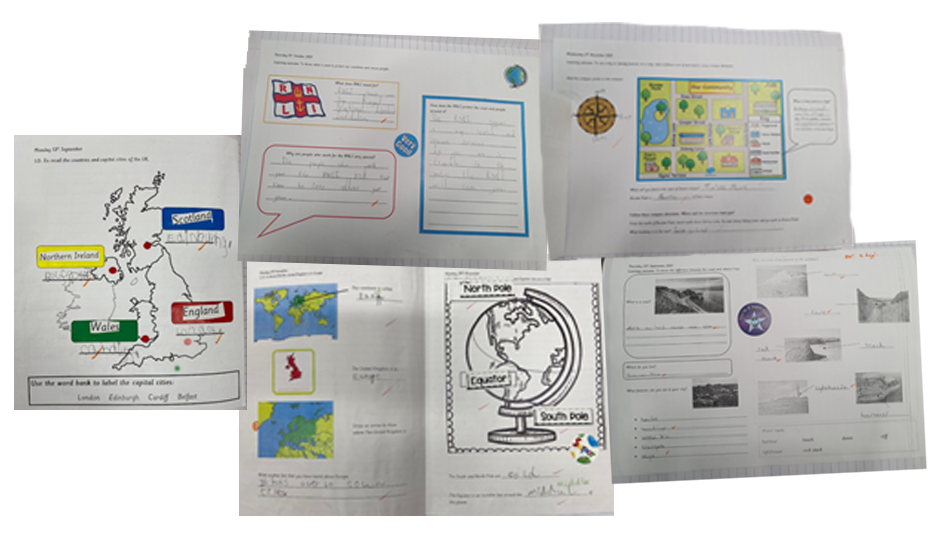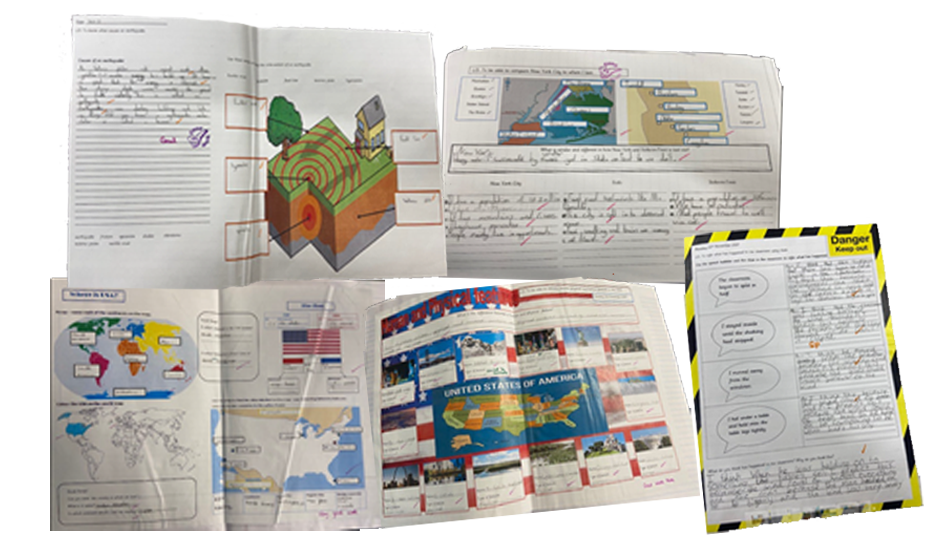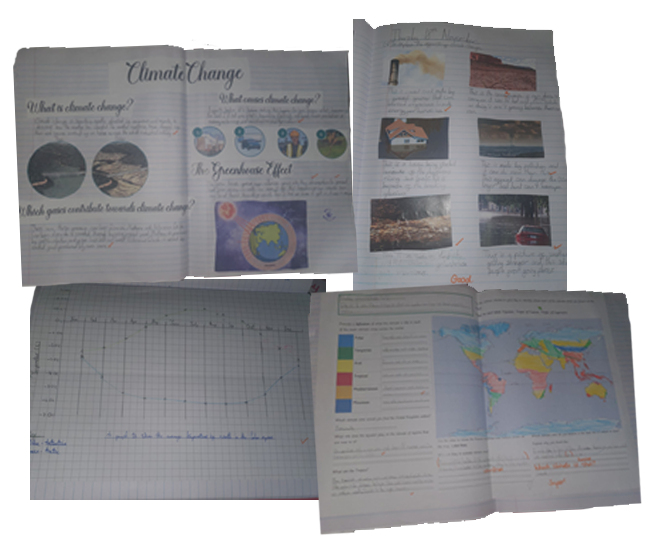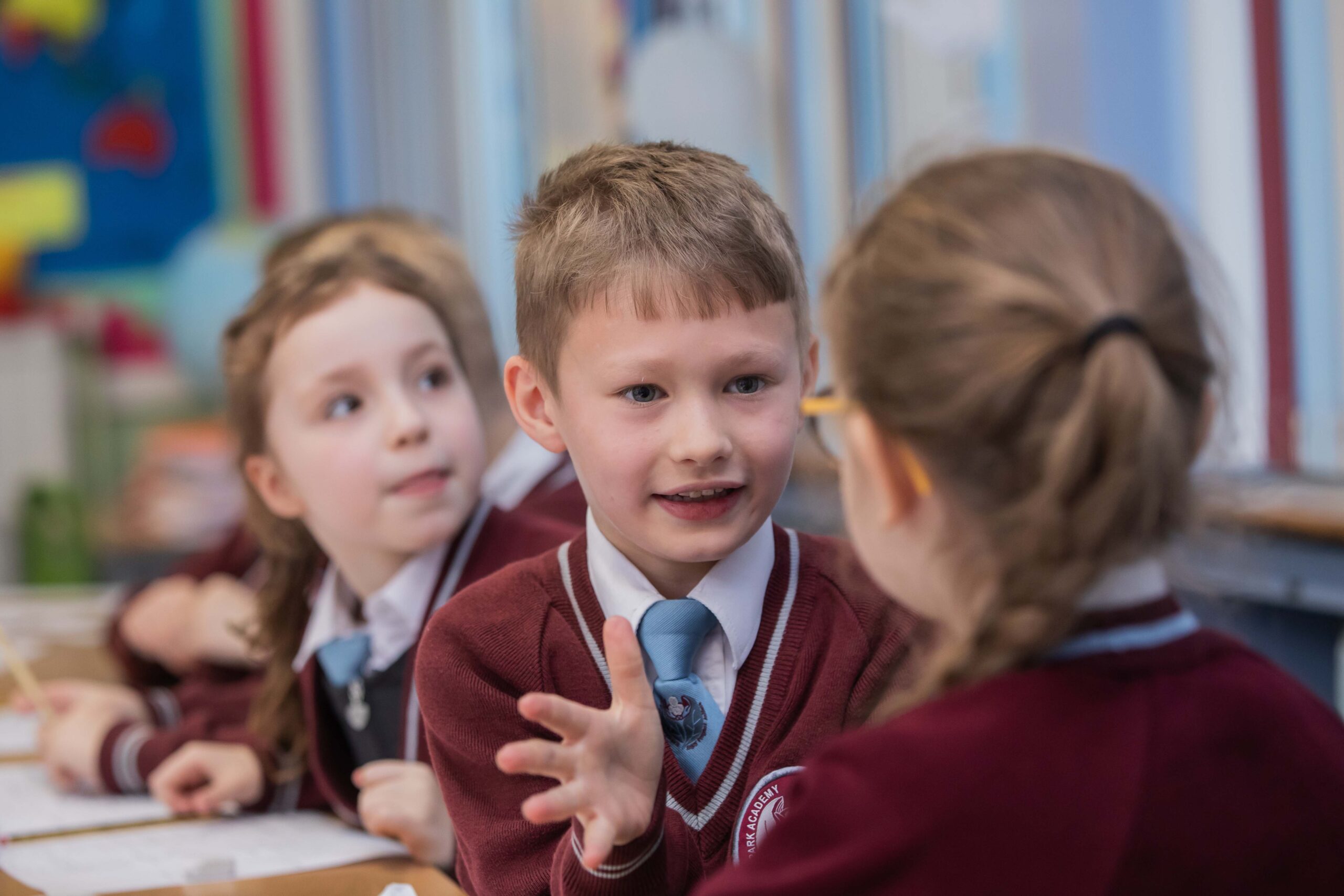Attendance Matters
The government has launched a national campaign to remind parents and carers of the importance…
Subject leader: Miss Spooner & Mrs Ruscoe
Subject coach: Mr Bell
Link governor: Mr Kelsall & Mr Law
With a wide and wonderful world to explore, geography is an essential subject in opening our children’s eyes to the incredible wonders of the planet around them. It helps pupils to gain a better understanding of places, people and environments and how to work towards a better future by protecting our ever-changing world. Through gaining knowledge of what places are like, how they compare with others and how their location impacts upon them, children will be able to develop greater awareness and links between their place in the world alongside those of others. Through a tailored geography curriculum embedded within the contexts of focus topics at Eaton Park, the subject provides meaningful contexts within cross-curricular links that make learning pertinent and provide geography with a high profile across the academy. Exciting opportunities encourage children to enquire about the world around them and question and debate how things work or could be changed, readying to the next step in the learning journeys.
As the geography leader within the academy, the role has a primary focus upon leading, developing and supporting the subject in all year bands in exciting, innovative and creative ways. Teachers are provided with support and CPD to ensure that they have knowledge, skills, resources and confidence to deliver engaging, interesting and challenging lessons which progress learning and enhance children’s cultural capital. Feedback, observations and discussions with both pupils and staff are used to enhance the quality of the curriculum provided, with proactive and imaginative ideas generated for how to act upon this.
Being subject leader, I am confident and knowledgeable within the subject through a real passion and love of exploring the world that children should also have the opportunity to develop. Relevant CPD and collaborative work alongside leaders from fellow Alpha trust schools are used to hone skills and provide information to disseminate to staff and reflect upon the practice taking place at Eaton Park.
The geography curriculum at Eaton Park has been constructed using the National Curriculum objectives as a guide. These cover four focus areas:
Through the supporting tool of the Cornerstones Curriculum, which is the driving tool for the focus topics delivered in each year band, staff have been provided with detailed, specific objectives that tie in with both the NC objectives and the desired outcomes from within each topic.
Key Stage One:
Pupils should be taught to:
Locational knowledge:
• Name and locate the world’s seven continents and five oceans.
• Name, locate and identify characteristics of the four countries and capital cities of the United Kingdom and its surrounding seas.
Place knowledge:
• Understand geographical similarities and differences through studying the human and physical geography of a small area of the United Kingdom, and of a small area in a contrasting non-European country.
Human and physical geography:
• Identify seasonal and daily weather patterns in the United Kingdom and the location of hot and cold areas of the world in relation to the Equator and the North and South Poles.
• Use basic geographical vocabulary to refer to:
– key physical features, including: beach, cliff, coast, forest, hill, mountain, sea, ocean, river, soil, valley, vegetation, season and weather.
– key human features, including: city, town, village, factory, farm, house, office, port, harbour and shop.
Geographical skills and fieldwork:
• Use world maps, atlases and globes to identify the United Kingdom and its countries, as well as the countries, continents and oceans studied at this key stage.
• Use simple compass directions (North, South, East and West) and locational and directional language [for example, near and far; left and right], to describe the location of features and routes on a map.
• Use aerial photographs and plan perspectives to recognise landmarks and basic human and physical features; devise a simple map; and use and construct basic symbols in a key.
• Use simple fieldwork and observational skills to study the geography of their school and its grounds and the key human and physical features of its surrounding environment.
Key Stage Two:
Pupils should be taught to:
Locational knowledge:
• Locate the world’s countries, using maps to focus on Europe (including the location of Russia) and North and South America, concentrating on their environmental regions, key physical and human characteristics, countries, and major cities.
• Name and locate counties and cities of the United Kingdom, geographical regions and their identifying human and physical characteristics, key topographical features (including hills, mountains, coasts and rivers), and land-use patterns; and understand how some of these aspects have changed over time.
• Identify the position and significance of latitude, longitude, Equator, Northern Hemisphere, Southern Hemisphere, the Tropics of Cancer and Capricorn, Arctic and Antarctic Circle, the Prime/Greenwich Meridian and time zones (including day and night).
Place knowledge:
• Understand geographical similarities and differences through the study of human and physical geography of a region of the United Kingdom, a region in a European country, and a region within North or South America.
Human and physical geography:
• Describe and understand key aspects of:
– physical geography, including: climate zones, biomes and vegetation belts, rivers, mountains, volcanoes and earthquakes, and the water cycle.
– human geography, including: types of settlement and land use, economic activity including trade links, and the distribution of natural resources including energy, food, minerals and water.
Geographical skills and fieldwork:
• Use maps, atlases, globes and digital/computer mapping to locate countries and describe features studied.
• Use the eight points of a compass, four and six-figure grid references, symbols and key (including the use of Ordnance Survey maps) to build their knowledge of the United Kingdom and the wider world.
• Use fieldwork to observe, measure, record and present the human and physical features in the local area using a range of methods, including sketch maps, plans and graphs, and digital technologies.
Within nursery and reception, geography plays a part within topic work covered during the year. The objectives that underpin this learning can be found within the Early Learning Goals, with the subject making a significant contribution to the ‘Understanding of the World’ ELG through activities such as trips, exploring the surrounding area including our woodland area and allotments and looking at different places around the world including their traditions, ways of life, religions and lifestyles. Time is spent discussing the children’s adventures both in and outside of school and encouraging the children to bring in items they have gained from visiting different places including their holidays.
Through the academy’s vision of improving the cultural capital of each pupil and ensuring that knowledge is retained, secure and embedded, ongoing assessment is paramount in supporting this. A wide range of strategies are used, including weekly recall tasks, warm up reviews in sessions, topic quizzes and pupil interviews with subject leaders. Teachers strive to provide skilled assessment within lessons as part of their commitment to quality first teaching through the use of activities, questioning and intervention marking to address misconceptions and extend learning to further challenge pupils’ love for developing subject knowledge. Curriculum Maestro is also used on a termly basis to provide formative assessment of each pupils’ capabilities and next steps within each subject.
SMSC – Considering the social, moral, spiritual and cultural aspects of our pupils as learners is something which can be well promoted through work within geography. Pupils have regular opportunities to develop their knowledge of the United Kingdom, with work upon key cities and places considering the impact of British values such as democracy. Through exploring nations around the world from both a geographical and historical viewpoint, pupils consider how other cultures and periods in time have had an impact upon the world in which we live as well as how change can be an important and necessary thing. These elements also promote the important tolerance of faiths and beliefs, mutual respect and individual liberty. Within our themed ‘Cultural Week’, pupils have further opportunities to explore cultures around the world through work on focus nations and workshops which look into how people around the world share both similar beliefs and customs and how they differ, thinking about the importance of people’s rights to believe and practise these.
Opportunities are readily available for pupils to question, explore and have their voices heard through a range of interactive learning strategies and enquiry-based learning. Pupils are given the regular chances through many of the things outlined within the Assessment for Learning section above to enhance their self-confidence within the subject by develop secure and embedded knowledge and skills which they can transfer into other elements of their learning.
Considering the importance of the local community, the environment and climate change are topics which pupils discuss on share their ideas upon. They have many chances to look at the importance of protecting the environment and reflect upon ways in which we can all work together to tackle climate change in order to aid the planet for the future.
Science – Through their links to exploring the world around us, science and geography provide many opportunities to not only explore both subjects in tandem, but to also enhance learning strategies within individuals. Being able to work scientifically supports enquiry-based learning while work upon animals and living things readily intertwines with geography when considering where habitats are found, the conditions within different biomes and how conditions help things to grow and thrive. How the Earth functions is examined further through the Earth and Space strand with rocks and seasons other elements explored within tailored topic areas covered across the academy.
History – History and geography understandably have many closely tied links, particularly with the United Kingdom being a nation whose heritage is linked to many places around the world. Pupils explore the origins of key periods in history, such as the Ancient Greeks and Egyptians, The Tudors and The Vikings, locating where in the world these civilisation began and how their impact was spread. Map work and pictorial evidence explore how places of changed and consider why cities were built in their locations in accordance with the time period that they arose. Within the A child’s War topic, pupils use map work to explore where children were evacuated from, where they moved to and the reasoning behind it. Children also consider how the likes of Captain Cook and Sir Walter Raleigh had an impact on the world through their global expeditions.
English – As with all subjects, geography plays a role in developing pupils’ knowledge and skills within reading, writing, speaking and listening. Writing opportunities are linked within each topic area covered, with many examples of non-fiction writing produced. Reading opportunities are linked into lessons as well as morning work activities while focus texts linked to topics are used to both support and enhance the learning opportunities within English lessons. Children also have opportunities to improve their confidence within speaking and listening through presentation opportunities linked to Eaton Park Speakers and pupil interviews.
Maths – Geography is a subject which supports and enhances knowledge and skills from across several strands of the mathematics curriculum. Statistics play a key role in developing pupils’ ability to interpret and record data, including when analysing temperature and rainfall. Field work helps children with work linked to how to measure distances and how to use scales to consider distances between two places. Map work also builds children’s knowledge of how to read grid references, supporting understanding of how co-ordinates work. Geography also supports pupils with how to calculate time differences thanks to comparing times in various cities and zones around the world.
Computing – Use of Scratch allows pupils to apply their coding skills to work on directional and positional language, something which is built initially in EYFS through the use of BeeBots. Thanks to the use of iPads, pupils are able to explore places around the world in more detail thanks to the use of maps and Google Earth, a particularly popular app with the children.
Art – Children’s knowledge and skills when producing pieces of work which demonstrate landscapes often link to both spatial and positional awareness as well as the opportunity to analyse well known places around the world in more detail. Pop Art techniques are also used within Upper Key Stage Two to create impressions of depth and 3-dimensional impressions of famous cities such as New York City. Work within the Around the World topic explores the meaning behind colours and shapes within flags from around the world, with the knowledge then applied by students to create their own flags to represent themselves.
MFL – Through our French lessons in the academy, pupils are given the opportunity to develop their ability to listen to, rehearse and say key words and phrases; these include considering where they live, countries around Europe and key places found within towns and cities.
EYFS – As part of their understanding of the world around them, pupils take trips including Amerton Farm and Conkers where they get the opportunity to sample, experience and compare different environments to those which they are used to.
Y1 – During the Bright Lights, Big City topic, children use sources of information and pictures to compare where they live to major cities such as London. Linking into science lessons, they also have opportunities for field work exploring the grounds of the school to consider how the four season affect the landscape and why they do so.
Y2 – Within their Street Detectives topic, children get a large grasp of their local environment, with regular field work both within the academy groups and the local community to consider the importance of different features of our local area.
Y3 – Pupils gain the opportunity through their Tribal Tales topic to consider the importance of archaeologists and their work, identifying within the school grounds in which to carry out an archaeological dig and using what they find to consider the history of the area and the changes that have been made since.
Y4 – Within Road Trip USA!, children use Google Earth and Google Expeditions to travel across the United States to investigate its size, consider how cities compare and contrast and identify famous landmarks known the world over.
Y5 – Within the Around the World topic, pupils use apps such as Google Earth to travel and explore the world to help to enhance their knowledge and skills around renowned places and landmarks. Additionally, they have the opportunity to visit London in a two-day residential, exploring the city’s landmarks and tourism industry as well as significantly enhancing their cultural capital.
Y6 – As a part of the pupil’s week-long residential to Stanley Head, they participate in several activities with a geography related focus within them. These can include work with rivers, using features of the landscapes to support survival and visits to areas such as Lud’s Church to explore and examine the history behind how the area has formed over time.
Pupil Voice:
“Geography is where you learn about different places all around the world.” Lucy Year 4
“We have learnt about the USA. Washington DC is the capital city. It has 50 states and 13 colonies. These represent the 50 stars and 13 stripes on the US flag.” Sophie Year 4
“I can ask a partner or a teacher if I am struggling. I can also use SMART.” Billy Year 3
“It is important to recall facts that we have learnt so we can remember. If we only do it once, we may forget.” Molly Year 3
“We locate continents, oceans and countries using atlases, globes and Google Maps on the whiteboard and the laptops. Spain, the UK, France, Germany, Greece and Italy are all in Europe. ” Jack Year 5
“Geography links to so many different subjects and everyday life. We can read about different places and issues in the world, like climate change. We can make graphs about temperatures in a country using maths. Last year we learnt about different landmarks in the USA and built them during DT lessons.” Harry Year 5
“In year 3, we learned all about Greece and in year 4, we looked at Rome and USA. Learning about different places gives you ideas for countries you want to travel to when you’re older.” Megan Year 5
Year 1 & 2:

Year 3 & 4:

Year 5 & 6:


Eaton Park Academy has been at the heart of our community for many years.
Our ambitious curriculum is shaped around the pupils and the community in which we serve.
Here you can find a collection of our latest news. We aim to keep all stakeholders as up-to-date as possible.
The government has launched a national campaign to remind parents and carers of the importance…
At Eaton Park Academy, ensuring the safety of our beloved students is our utmost priority.…
Tuesday 30th January 2024: Year 1 took part in our Kings and Queens workshop! 🫅👸…
Monday 29th January 2024: Year 5 travelled back in time to the Tudor Period to…
What fantastic trips to Chester Zoo Eaton Park has had! 🤩 The trips during the…
🏃🏼♀️🏃🏻♂️🏆Sportshall Athletics 🏆🏃🏻♂️🏃🏼♀️ On Monday 20th November, Eaton Park’s Sportshall Athletics team travelled to Fenton…
Yesterday, 80 families attended the Bread and Butter Thing @ The Bentilee Family Hub. A big thank you to all the volunteers,…
Alpha Academies Trust are very excited to be part of the collaborative approach to the…
If you require a paper copy of any of the pages / documents published on this website, please click here and complete the form stating which page(s) / document(s) you require along with your name and address.